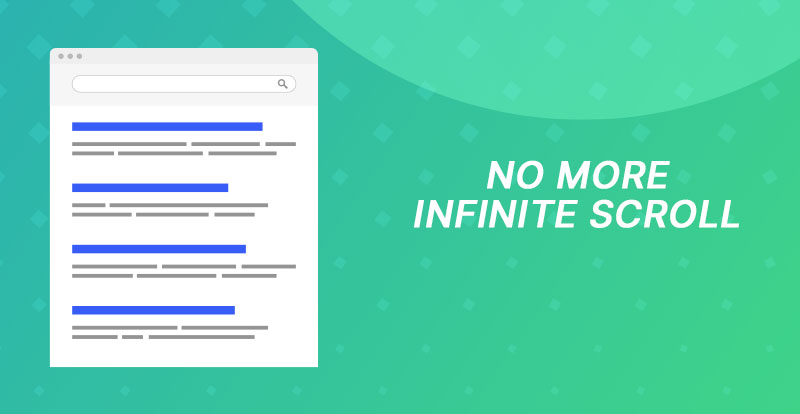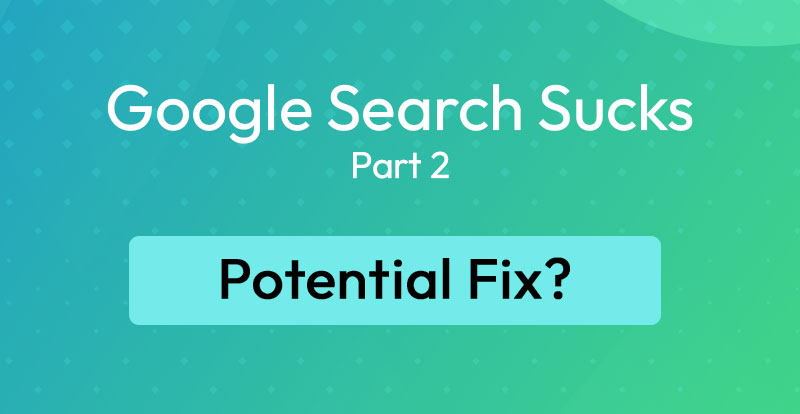You might have noticed that your Google search results changed the other day. It’s not a massive change as you can still expect Google to provide thorough and lengthy lists of results for your queries (even if they suck). No, the change had to do with how you see those results. Infinite Scroll has been an incredibly useful feature for modern search engines and social media platforms. A user would simply continue to scroll and the results would continue to generate, which meant you didn’t need to click another page to see more of them. Now, Google has announced they’ve gotten rid of Infinite Scroll in their search results, and that’s a big change.
It hasn’t necessarily changed your life, but Infinite Scroll has revolutionized how people experience the internet. A news report recently stated that a major reason social media is considered harmful is due to infinite scrolling. The more results or videos placed in front of people the more likely they are to view them. Supposedly, the endless results help to avoid distractions, but is it actually benefitting the user?
For almost 20 years Infinite Scroll has been a part of the internet. It’s changed websites and e-commerce landscapes and has potentially had a huge impact on the average attention span. So now that Google has retired the feature from its search results, let’s see just how much impact Infinite Scroll has had on the World Wide Web.
What is Infinite Scroll?
Infinite Scroll, as it is commonly known, has actually been around for a while. It was first developed by a Mozilla engineer in 2006 and has become a staple of numerous websites, social media sites, and web stores. The idea itself isn’t sophisticated, its basic principle is to provide you with more content without you having to exude any effort. That’s a lazy person’s dream, and it’s been working for 18 years. Every time a user scrolls through a page with Infinite Scroll, that page doesn’t end until the results do.
For social media websites, that means you’re going to see reel after reel instead of the bottom of the page. The feature is fairly old, for the digital age, but Google only added it about 3 years ago in 2021. They might have been late to the game, but the goal was to show more results after the first page. While they said the initial reasoning was to provide more results, the most commonly believed reason is that it provides more ads.
The more results you scroll through, the more ads you see, it’s as simple as that.
While Google jumped headfirst into Infinite Scroll, many of its users noted the difference between it and the previous pagination. Seeing you were on Page 6 of Google search results provided context while being in the middle of an infinite scroll just encourages more browsing. So after just a few years, Google has seemingly changed its mind about Infinite Scroll.
What happened?
Why Google Removed Infinite Scroll
I wouldn’t blame you if you didn’t hear about Google removing Infinite Scroll, a lot of people didn’t hear about it. When Google made some updates to their Spam policies earlier this year, they made an announcement. They even posted an explanation on their Google Search Console updates, so why didn’t they do something similar with the removal of Infinite Scroll?
The exact answer for a lack of announcement isn’t known. Sometimes companies just retire features, products, or entire brands without notice. When your company has almost a trillion-dollar valuation, you don’t always have to explain everything. In an article on Search Engine Land, they did provide a reason for this change. Their given reason is that users will get more accurate search results faster and you’ll avoid some of the less relevant links you previously saw. Now, we’re back to the days of numbered pages, and that’s not necessarily a bad thing. Though many will see it as an inconvenience.
Due to the removal of Infinite Scroll, users will have to interact with the search results, but that will help to refine them. Users will now have to definitively decide whether or not these results helped them. Also, many users reported that since the introduction of more AI features, search results have become easier to game and manipulate. That means you’re likely seeing more ads and extremely SEO-optimized pages designed to appear in searches but not necessarily designed to address your query.
So before being apprehensive of Infinite Scroll removal, let’s go over how that affects the user experience.
Impact On Users
User Experience and Convenience
The removal will make scrolling more difficult, but it will ultimately make results easier to navigate. You won’t lose that entry after scrolling too fast when the result page number is there to identify. It also removes distractions and keeps users focused on the results. You’ll be forced to think about whether or not a page of results addressed your search.
Search Behavior
Some people want 50 results per page and some want 10, but when you have pagination you get a choice. Not everyone wants to sift through a catalog of options when making a search. Pagination allows users to customize the results to their preferences, which consequently immediately improves their experience. With more limited options, users will be more inclined to reach entries and select them, improving CTR (click-through rate).
Accessibility
I’ve explained how you can test your website for ADA compliance to ensure it's as accessible as possible, and Google’s move back to pagination also improves accessibility. Pagination makes search results easier to navigate, which makes content easier to find for those with unique keyboards or forms of navigation. Not only that, but with defined search result amounts accessibility is greatly improved.
Mobile vs Desktop Experience
Swiping is easier than scrolling, which explains why Infinite Scroll is better for mobile users than it is for desktop users. A desktop displays more information than a mobile version of a result or a website, so users are more likely to spend time analyzing each entry than those on mobile. When they don’t have a page number to help navigate the results though, it’s not exactly improving those user’s experience.
Impact on Website Owners and SEO
Anyone who’s used Infinite Scroll knows that the first results load well, but the more you scroll the longer it takes those results to load. That increases the engagement with the first results but decreases the engagement with those further down. While results with pagination load, users get the exact page they desired on a list of results they can easily navigate.
Unfortunately, removing Infinite Scroll doesn’t benefit everybody. Users will now need to focus on getting higher rankings via page numbers, instead of just appearing higher up in the general search results. Being on the first page of Google’s search results is worth thousands or millions depending on the industry, and website owners will have to focus even more attention and money on achieving that. Make sure your content has every tool available to move up those rankings.
Meta descriptions, tags, and snippets for Google’s crawlers to pull from - these can all help users climb past their competition. It’s also a great opportunity for advertisers. Pagination has been shown to improve ad revenue as you target different keywords. This could lead to marketing campaigns that target specific keywords instead of markets or demographics.
While that could be effective, it could also lead to over-optimization and should be used very carefully.
Broader Industry Implications
Don’t take this as a sign of Infinite Scroll’s demise. It’s as popular as ever. If a social media platform doesn’t have Infinite Scroll in some way, it’s likely leagues behind its competitors. The issue is that while it’s appropriate for social media platforms, it’s not exactly easy for specific searches or even online shopping. E-commerce buyers are fickle and picky. They like filters and search bars so making product results harder to navigate is going to do much more harm than good.
Social media platforms want to draw you in and keep you there; search engines want to give you the exact link you want. The more ways a search can be focused or customized the more chance you have of finding what you want. Over time, you might see Google add even more ways of navigating or focusing your search like search filters or even information types.
User Feedback and Industry Reactions
While I wanted to cover the positives and negatives of this change, let’s not kid ourselves, most people are praising this decision. A post on Reddit with hundreds of comments is filled with users complaining about Infinite Scroll and the quality of current results. You can even see users complaining that Google searches just redirect them back to Reddit. Infinite Scroll was only added 3 years ago, but it seems this was a long time coming to the average user.
A user on X, formerly known as Twitter, replied to the announcement with a hilarious fist-pump gif. While many users are fans of Infinite Scroll, it looks like the vocal majority is against it, which is likely what prompted Google to make the change in the first place.
The folks over at ZD Net had a good point to make on the change. Users will lose that convenient Infinite Scroll they’ve become accustomed to and will have to click more buttons, but results will be easier to navigate and revisit. Just like any big technological change, users will have to adjust. It’ll take some time, but most of them will find that hitting the bottom of a Google search result page is not the end of the world.



